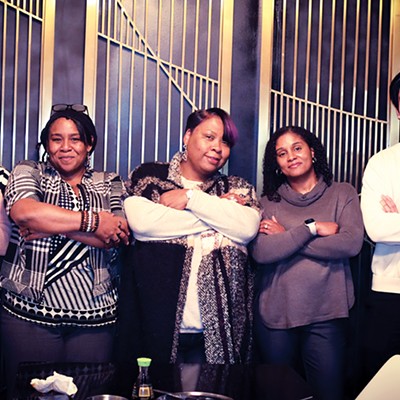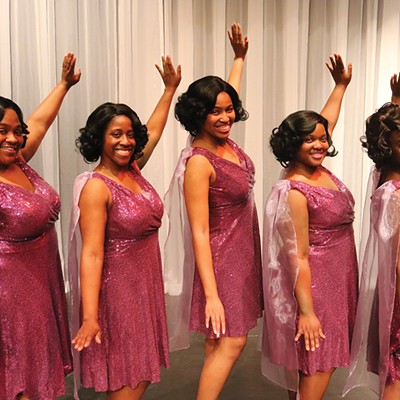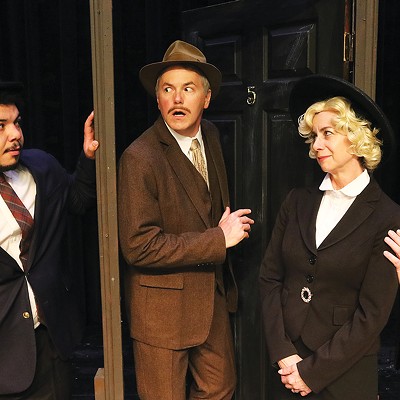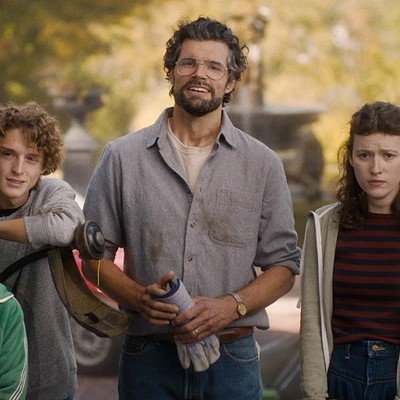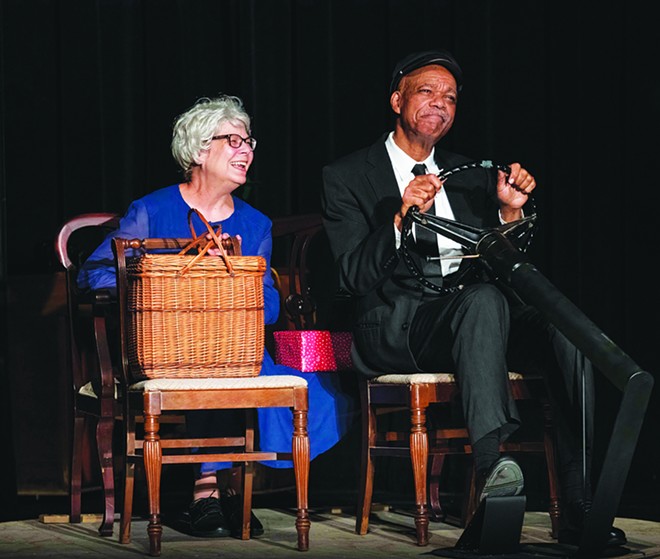
The 1988 Pulitzer Prize for drama was awarded to a small, three-character off-Broadway play, Driving Miss Daisy, a play that still has lessons for us today. The Pulitzer Prize is awarded to distinguished work by an American author, preferably original in its source, and dealing with American life.
Driving Miss Daisy premiered 35 years ago, running 1,195 performances. Spencer Theatre Company now offers a chance to take a look at the play, running through this weekend at the Hoogland Center for the Arts, featuring a polished ensemble consisting of Felicia Coulter, Tim Crawford and Greg Floyd. It has to be noted that the effervescent, and at the top-of-her-game Felicia Coulter reigns as star over all the proceedings. I imagine director Chuck McCue took his cues from Coulter's obvious instincts for playing this role.
Driving Miss Daisy spans 25 years and is based on playwright Alfred Uhry's own grandmother at a time in later life when this proud Jewish woman in Bible-belt Atlanta was forced to hire a chauffeur when she was not allowed to drive anymore. The 1989 film won Jessica Tandy an Oscar. Morgan Freeman played the chauffeur and originated the role on stage with Dana Ivey.
The fact that a small, 90-minute play with almost no scenery and an automobile comprised of two chairs became such a hit in New York and won the Pulitzer Prize was a surprise. (A runner-up that year was Eric Bogosian's gritty Talk Radio.) This current production is a welcome surprise too, mainly because the play and film have somewhat receded in most people's memory through the years. And it's a chance to see talented actors work together so beautifully.
Greg Floyd has been seen on stage in the area for several decades now, which is hard to believe with his youthfulness. He and Coulter perform together so truthfully, it's as if they have their own shorthand to play off each other.
Tim Crawford grabs onto the character of Hoke, and his scenes with both Floyd and Coulter are rich with all of their good comic timing. Miss Daisy is cruel to Hoke in the early scenes of the play, and he mainly lets it roll off of him in his stoic way. It's a lesson in acting, watching these two slowly learn to deal with each other, and who, eventually, become people who look out for each other.
Guided by director McCue, the actors age 25 years during the play. There is no heavy-handed, overly theatrical tricks at play here. You notice a different gait as they walk and move about the stage. A subtle slowness creeps up on them in certain scenes; even their voices change.
The production runs smoothly and I give kudos to Michelle Tebrugge's stage crew who move set pieces around like a ballet. There are many nice touches in Gene Hinckley's lighting and sound design.
The 90-minute performance is rich with laughs and some sobering moments. By play's end we feel we know these people, and probably see some of our own relatives in it.
The play also has one of the most poignant and moving scenes ever played on a stage, still as breathtaking and powerful now as it was when I first saw it 35 years ago.
Alfred Uhry wrote two more plays in what he called his Atlanta Trilogy: the comedy-drama The Last Night of Ballyhoo and the musical Parade. He always wrote his plays with elements of historical background: Ballyhoo takes place the night of the world premiere of Gone With the Wind in Atlanta. (Please, Spencer Theatre Co., think about producing this one.) Parade was based on the 1913 imprisonment and eventual lynching of Leo Frank. In Daisy, it was the bombing of the Hebrew Benevolent Congregation Temple and a dinner in Atlanta honoring Martin Luther King's 1964 Nobel Peace Prize that are historical pinpoints.
When the film was released and won the Oscar for Best Picture, a backlash began. The film (and to some extent the play) was considered by many a too-safely-told story in which racial problems were addressed, but that suggested lessons had been learned and the past was past. We are reminded today that the past is certainly not merely the past.
That same year Spike Lee's landmark film Do the Right Thing was released and was glaringly not nominated.
Driving Miss Daisy continues this weekend: Friday and Saturday at 8 p.m. and Sunday at 4 p.m. Tickets at www.SpencerTheatreCompany.com or Hoogland Center, 217-523-2787.
Phil Funkenbusch is a theater practitioner, living in Havana and currently working on a theater project there: Stories I Ain't Told Nobody Yet by Jo Carson. He can be reached at [email protected].


